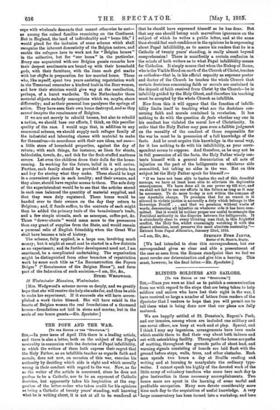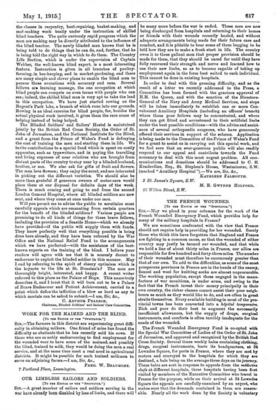BLINDED SOLDIERS AND SAILORS. [To vas Ernes or vex ••ftescrases."3
Sra,—Since you were so kind as to publish a communication from me with regard to the steps that are being taken to help soldiers and sailors who have lost their sight in the war, I have received so large a number of letters from readers of the Spectator that I venture to hope that you will permit me to tell them what is being done now that our plans are fully matured.
We are happily settled at St. Dunstan% Regent's Park, and our inmates, among whom are included one military and one naval officer, are busy at work and at play. Special, and I think I may say ingenious, arrangements have been made which enable them to find their way about both indoors and out with astonishing facility. Throughout the house are paths of matting, throughout the grounds paths of sheet lead, and warning signals consisting of boards are laid flush with the ground before steps, walls, trees, and other obstacles. Each man spends two hours a day at Braille reading and writing and at learning to manipulate the ordinary type- writer. I cannot speak too highly of the devoted work of the little army of voluntary teachers who come here each day tp give instruction in these necessary accomplishments. Two hours more are spent in the learning of some useful and profitable occupation. Many men devote considerably more time each day to the acquisition of useful knowledge. A very large conservatory has been turned into a workshop, and here the classes in carpentry, boot-repairing, basket-making, and mat-malting work busily under the instruction of skilled blind teachers. The quite curiously rapid progress which the men are making may be directly attributed to the influence of the blind teacher. The newly blinded man knows that he is being told to do things that he can do, and, further, that he is being told the right way in which to do them. The Country Life Section, which is under the supervision of Captain Webber, the well-known blind expert. is a most interesting feature. Instruction is given in all branches of poultry- farming, in bee-keeping, and in market-gardening, and there are many simple and clever plane to enable the blind men to pursue these avocations with accuracy and ease. Several fellows are learning massage, the one occupation at which blind people can compete on even terms with people who can see ; indeed, the skilled blind man is very apt to take the lead in this occupation. We have just started rowing on the Regent's Park lake, a branch of which rune into our grounds. Rowing is an ideal exercise for blind people, for, besides the actual physical work involved, it gives them the rare sense of helping instead of being helped.
The Blinded Soldiers' and Sailors' Hostel is maintained jointly by the British Red Cross Society, the Order of St. John of Jerusalem, and the National Institute for the Blind. and a grant from the Prince of Wales's Fund is defraying the coat of training the men and starting them in life. We invite contributions to a special fund which is spent on costly apparatus, such as typewriters, and in paying the travelling and living expenses of near relatives who are brought from distant parts of the country to stay near by a blinded husband, brother, or son. We also ask for gifts of fruit and flowers. The men love flowers ; they enjoy the scent, and are interested in picking out the different varieties. We should also be more than grateful if generous owners of motor-cars would place them at our disposal for definite days of the week. There is much coming and going to and from the second London General Hospital, where all blinded soldiers are now sent, and where they come at once under our care.
Will you permit me to advise the public, to scrutinize most carefully appeals which are emanating from certain quarters for the benefit of the blinded soldiers P Various people are promising to do all kinds of things for these brave fellows, including the provision of a. Seaside Home—which we already have provided—if the public will supply them with funds. They know perfectly well that everything possible is being done here already, and they have been referred by the War Office and the National Relief Fund to the arrangements which we have perfected—with the assistance of the beet- known experts on the training of the blind. I believe your readers will agree with me that it is scarcely decent to endeavour to exploit the blinded soldier in this manner. May I end by referring to the spirit of cheery optimism which is the keynote to the life at St. Dunstan's P The men are thoroughly bright, interested, and happy. A recent writer referred to this place as the Palace of Hope. This name truly describes it, and 1 trust that it will turn out to be a Palace of Brave Endeavour and Patient Achievement, carried to a point which defies the infliction of a blow as hard as any to which mortals can be asked to submit. —I am, Sir, dm.,
C. ARTHUR PEARSON,
Chairman, Blinded Soldiers' and Sailors' Care Commute..



































 Previous page
Previous page